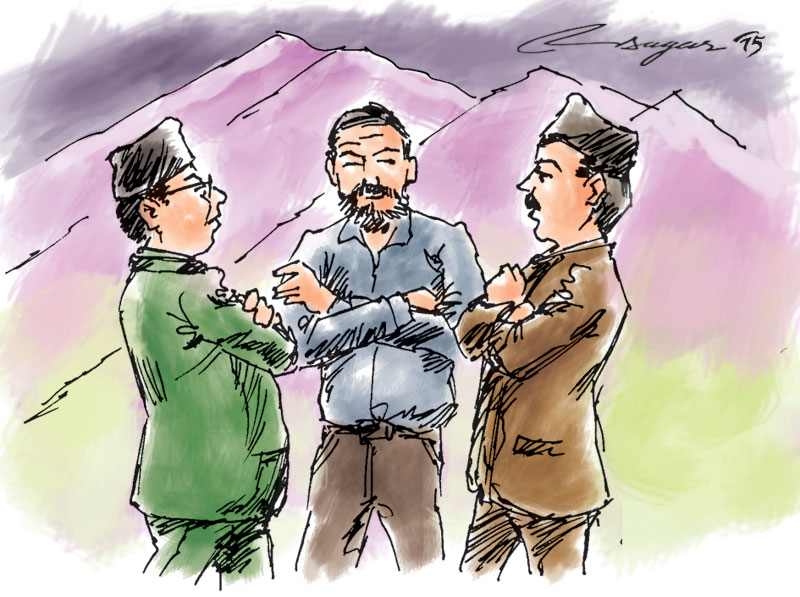Nepal at crossroads: Expanding nexus for nationalism
Implementation of the rule of law is poor. In such a situation, democracy is imprisoned by neo-feudal leaders to serve their own purposes. Empowering the people is the basic step in strengthening democracy so as to promote nationalism
The concept of a nation-state is the fusion between emotion and the legitimacy to rule a nation developed after the colonial era. The cohesive factors to national integration are the common belonging, common religion and language, specific geography with defined threat and overall common identity. It is easy to form a state but difficult to assimilate all the factors into one to make a successful nation. The vested interest within and outside the nation weakens its development, internally as well as externally.
The symbol of unity for better nationhood during the royal regime was confined to praising the monarch and his system. The people were considered as commoners or slaves. The theme of national anthem of that time was an example of such practices. The culture of feudal hegemony was badly inculcated deep into our society. Notwithstanding the ground reality, we still believe such feudal oriented leaders easily.
Hence, it is argued that even the popular unrest of 2006 could not fully change the societal character and define what most Nepalis wanted. The society is still plagued by neo-feudalism with different dynamics. In such a paradigm, how can our nationalism be promoted? A need for a model of nationalism is highly realized in the present context of Nepali society.
Promotion of nationalism is a positive connotation. But extremism is negative to nationalism. The rationality behind nationalism is a love for the homeland; faith in religion, language and tradition; pride on one’s culture and philosophy. The schooling helps develop philosophy and culture which is a combination of religion, philosophy and tradition. Whether we are cultured or not can be mapped through religious inclusiveness, open or conservative by schooling. Extremism is a synonym of fundamentalism. In any forms and manifestation, the radicalization of religion ruins the society. The present rise of religious fundamentalism as the Islamic State in Iraq has challenged the traditional nation-state and colonial era border based nationalities in the Middle-East. On the contrary, in Nepal, where 81 per cent are Hindus—the social and religious harmony has not been threatened, because of its high level of tolerance. Perhaps, it is the single factor that maintained cohesiveness in the form of nationalism intact.
The Islamic State has expanded in the areas where the state had no or little control, and their presence in the form of service delivery was poor. Similarly, the frustration among the youths against the various regimes has a profound base to recruit the combatants within the territory. The international nexus among various radical groups also encourages such youths to join them. The youth mobilization is comparatively easier as they are volatile and can be motivated easily. In the societies where illiteracy prevails, economy is very weak and politics is fragile, the youths are likely to get involved in crime for easy money. In Nepal, the mainstream political parties were reluctant to deliver a new constitution before the mega earthquake. The government composed of two main parties came under controversy for its inability to address rescue and relief at the beginning and was incapable of mobilizing national as well as international donors for reconstruction. The reason for mistrust was due to the government’s service delivery and image being unaccountable, irresponsive and non-transparent. The legitimacy of the government is not questioned, but its effectiveness as well as popular base is in peril. In a democracy, legitimacy is one aspect but effective service delivery is another.
Presently, almost 1500 youths fly to Gulf countries, Malaysia and abroad everyday in the quest of new jobs in the international labour markets. In the wake of the mega-earthquake, Nepal is itself in a short supply of labour to reconstruct the infrastructures and buildings as it has not adopted a proper labour policy to meet the internal demand. It is high time for the nation to convert the remittance-based economy to an industrial-based one for better stability and development. The public policy makers have not taken care of another dark side of the consequences of the mega-earthquake displaced the people from their homes. Young Nepali girls are forced to join brothels in Indian cities. Likewise, many youths are migrating illegally to Europe and Latin America in the quest of better lives. Nepal is not in an active conflict environment but the people are suffering due to the protracted political transition. The youths are frustrated due to lack of sufficient opportunities. Almost all spheres of national life is politicized. Jobs are limited to those who are close to powerful politicians. The people are not empowered through appropriate public policies and their implementation. The laws and bylaws are either incomplete or misinterpreted for vested interest.
Implementation of the rule of law is poor. In such a situation, democracy is imprisoned by neo-feudal leaders to serve their own purposes. Empowering the people is the basic step to strengthen democracy so as to promote nationalism. As we all know, crisis brings us together and increases feeling of nationalism.
Perhaps, at this crisis the mega-earthquake has compelled our leaders to unite for consensus to promulgate the new constitution. Let this realization make us expand our nationalism and build this nation further.
Dr. Bhattarai is ex-Brig General of Nepali Army and presently a visiting faculty at Tribhuvan University
and Lumbini Buddhist University of Nepal.






